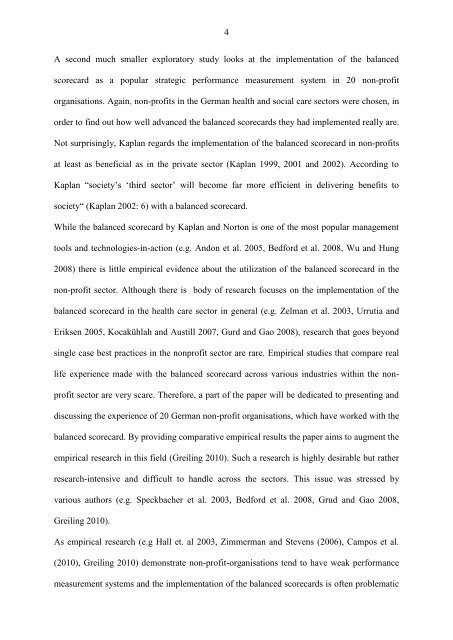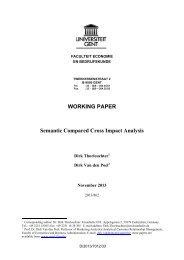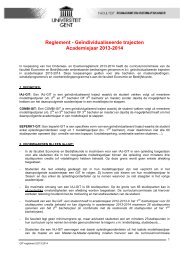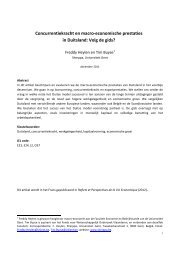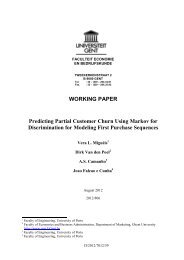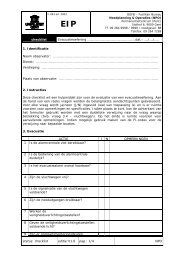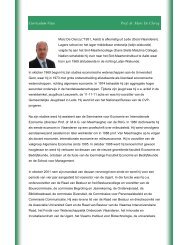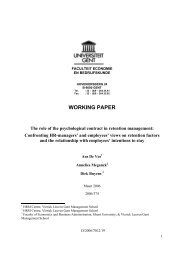Strategic responses to Performance Measurement in Nonprofit ...
Strategic responses to Performance Measurement in Nonprofit ...
Strategic responses to Performance Measurement in Nonprofit ...
Create successful ePaper yourself
Turn your PDF publications into a flip-book with our unique Google optimized e-Paper software.
4<br />
A second much smaller explora<strong>to</strong>ry study looks at the implementation of the balanced<br />
scorecard as a popular strategic performance measurement system <strong>in</strong> 20 non-profit<br />
organisations. Aga<strong>in</strong>, non-profits <strong>in</strong> the German health and social care sec<strong>to</strong>rs were chosen, <strong>in</strong><br />
order <strong>to</strong> f<strong>in</strong>d out how well advanced the balanced scorecards they had implemented really are.<br />
Not surpris<strong>in</strong>gly, Kaplan regards the implementation of the balanced scorecard <strong>in</strong> non-profits<br />
at least as beneficial as <strong>in</strong> the private sec<strong>to</strong>r (Kaplan 1999, 2001 and 2002). Accord<strong>in</strong>g <strong>to</strong><br />
Kaplan “society‟s „third sec<strong>to</strong>r‟ will become far more efficient <strong>in</strong> deliver<strong>in</strong>g benefits <strong>to</strong><br />
society“ (Kaplan 2002: 6) with a balanced scorecard.<br />
While the balanced scorecard by Kaplan and Nor<strong>to</strong>n is one of the most popular management<br />
<strong>to</strong>ols and technologies-<strong>in</strong>-action (e.g. Andon et al. 2005, Bedford et al. 2008, Wu and Hung<br />
2008) there is little empirical evidence about the utilization of the balanced scorecard <strong>in</strong> the<br />
non-profit sec<strong>to</strong>r. Although there is body of research focuses on the implementation of the<br />
balanced scorecard <strong>in</strong> the health care sec<strong>to</strong>r <strong>in</strong> general (e.g. Zelman et al. 2003, Urrutia and<br />
Eriksen 2005, Kocakühlah and Austill 2007, Gurd and Gao 2008), research that goes beyond<br />
s<strong>in</strong>gle case best practices <strong>in</strong> the nonprofit sec<strong>to</strong>r are rare. Empirical studies that compare real<br />
life experience made with the balanced scorecard across various <strong>in</strong>dustries with<strong>in</strong> the non-<br />
profit sec<strong>to</strong>r are very scare. Therefore, a part of the paper will be dedicated <strong>to</strong> present<strong>in</strong>g and<br />
discuss<strong>in</strong>g the experience of 20 German non-profit organisations, which have worked with the<br />
balanced scorecard. By provid<strong>in</strong>g comparative empirical results the paper aims <strong>to</strong> augment the<br />
empirical research <strong>in</strong> this field (Greil<strong>in</strong>g 2010). Such a research is highly desirable but rather<br />
research-<strong>in</strong>tensive and difficult <strong>to</strong> handle across the sec<strong>to</strong>rs. This issue was stressed by<br />
various authors (e.g. Speckbacher et al. 2003, Bedford et al. 2008, Grud and Gao 2008,<br />
Greil<strong>in</strong>g 2010).<br />
As empirical research (e.g Hall et. al 2003, Zimmerman and Stevens (2006), Campos et al.<br />
(2010), Greil<strong>in</strong>g 2010) demonstrate non-profit-organisations tend <strong>to</strong> have weak performance<br />
measurement systems and the implementation of the balanced scorecards is often problematic


